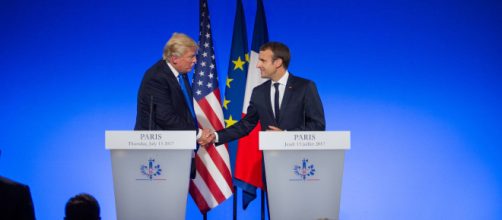On Monday, the French President Emmanuel Macron and his wife arrive in Washington for the Trump Presidency's first official state visit. The two men met on several previous occasions, and what started out as a frosty, suspicion-filled relationship now appears to be a blossoming bromance.
So what has changed since the bitter exchanges surrounding the Paris Agreement? Let's take a look back. The first encounter took place at the Nato summit, just a couple of weeks after Emmanuel Macron had been elected. Before that, Macron had obviously prepared himself for Donald Trump's infamous handshake and made every effort to stand his ground.
So, the world witnessed what is now referred to as the Trump-Macron white-knuckle handshake.
Subsequently, when Donald Trump withdrew from the Paris Agreement on climate, Macron was not impressed. However, he invited the American president to collaborate on the issues and find solutions to the challenges posed by climate change. At that time, a bromance between the two men seemed unlikely, but surprisingly, Macron invited the American President to France for Bastille Day celebrations.
According to The New Yorker, Trump joined the festivities, and Macron reportedly passionately spoke about the alliance between the two nations, saying that it “fully justifies the presence of President Trump today and tomorrow in Paris.”
In turn, the American president called Macron a "great President, a tough President." Despite disagreements on climate change, Macron and Trump identified a "common red line" in relation to the use of chemical weapons in Syria which ultimately led to the recent joint airstrikes.
To illustrate how the relationship had changed, let's look at the 29-second Bastille Day handshake.
So, why the bromance?
Macron's official visit has seen countless media outlets highlighting the blossoming bromance between the two men. According to a BBC news report, the French president has been able to position himself as Trump's go-to leader in Europe. With Britan leaving the European Union and Germany accepting millions of migrants, the French president appears the most likely European ally for Trump. So, despite the considerable age gap and differences in style and approach, the two men appear eager to foster a close relationship.
Whereas Britain and Germany may have collaborated closely with previous American administrations, Macron now seems eager to take on a role as an international player.
According to The New Yorker, he has offered to mediate between Turkish and Syrian Kurds. What's more, Macron stepped in after the Lebanese Prime Minister went missing in Saudi Arabia.
But what's there to gain for Donald Trump? According to the BBC, he may consider France as the best potential support for military action, seeing as Britain may be slow to engage in a new conflict after Iraq. In addition, many also believe that Donald Trump likes the flattery and attention he's been receiving from Macron. Emmanuel Macron also promised the American president to edge France closer to the two percent-GDP-spend on military equipment set as a target by Nato member states, so The New Yorker reports.
Macron will need to tread gently
The American president has been falling out with many people. Close friendships and working relationships appear fickle. Observers stress that Emmanuel Macron must be careful not to attack Donald Trump personally. But the French president also needs to keep his voters happy.
In France, a close relationship with America may not necessarily be seen as a good thing. According to the BBC, the French president has to find the right balance between protecting France's interests and playing a significant role on the international stage - all the while keeping Donald Trump happy.


